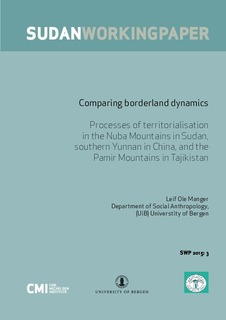Comparing Borderland Dynamics. Processes of territorialization in the Nuba Mountains in Sudan, southern Yunnan in China, and the Pamir Mountains in Tajikistan.
Working paper
Permanent lenke
http://hdl.handle.net/11250/2475024Utgivelsesdato
2015-03-19Metadata
Vis full innførselSamlinger
- Publications [1488]
Originalversjon
Bergen: Chr. Michelsen Institute (Sudan Working Paper no. SWP 2015:3)Sammendrag
The paper is a contribution to the recent debate in social science of border situations and the way borders affect borderland populations. The paper is directly comparative in form, by comparing three borderland situations, in the Nuba Mountains in Sudan, in the south-western Yunnan in China and in the Pamir Mountains in Tajikistan. The point made is that such a comparison can show how border areas understood as violent “zones of exception” as well as more normal zones, like “free trade zones” emerge as historical possibilities in the three cases. We see that the historical developments of the three states involved provide crucial contexts for the ways such zones can develop, from the contemporary violence in the Nuba case to the economic development in Yunnan, in an area or zone that historically was full of violence and war. The state-society interaction is thus not pre-given, but allows for various processes of territorialization and thus also opens for a more hopeful future also in cases of violent conflicts, such as in the Nuba Mountains or the Pamir Mountains. But the balance is a precarious one, and does not have any in-built direction or dynamic. It is only by detailed ethnographic analysis that we might grasp the on-going processes in the meeting between states, markets, communities and zones. Such meetings create new imaginaries, and new moral economies are emerging within new organizational and economic forms. Hence, a conclusion is to criticize notions of “weak states” and “incomplete transitions” as conceptual starting points for understanding the cases. Rather than evolutionary transitions we need to understand the interaction of local, regional, national and international forces, creating new patterns of global power and global assemblages.
